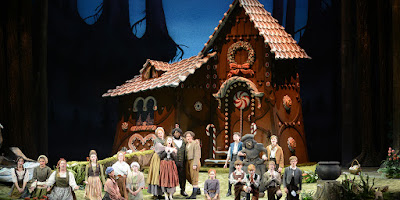Stage director of the opera "Hansel and Gretel" has vision of both realism and mystery
 |
| The happy ending of Engelbert Humperdinck's "Hansel and Gretel" |
The Engelbert Humperdinck opera is less familiar, and the composer's name to many brings up a late- 20th-century pop singer rather than a German composer (1854-1921). "Hansel and Gretel" (to use its English title, since it will be performed here in English) comes to Clowes Hall this weekend in an Indiana University Jacobs School of Music Opera Theater production.
 |
| Michael Shell brings an extensive resume to IU. |
From a stage director's perspective, "number operas are more challenging," said Michael Shell in a
phone interview last week, between the production's premiere in Bloomington and its transfer to Indianapolis for performances Friday and Saturday. In contrast, "this is never vocal calisthenics for showing off the voice. You can tell a very economical story when the music just keeps going. Ultimately that's better storytelling."
Shell just joined the faculty of IU's Jacobs School of Music this fall, specializing in opera and musical theater. With "Hansel and Gretel," he inherits a production that first saw life on campus in 1982. He and the production team have made a few changes, some technical, some aesthetic.
"What we did this time was on a fairytale-esque scale," he explained, alluding its source in the Brothers Grimm classic. "Prior productions were not looking at the grittiness; the whole family is pretty poor. They had been pristine-perfect in their clothing. There's a little bit more realism, in a way." He also rejected making the Witch the "broad comic character" of some versions, where "you weren't really scared of the Witch, and it seems kind of cruel for Hansel and Gretel to kill her."
Of course, Shell can't go all the way in the direction of realism, for the story is rife with the supernatural and the fantastic. There are the nocturnal visits to the weary siblings by the Dew Fairy and the Sandman, who are conceived in gender-ambiguous terms here. And, he said, there's no stinting of the show's climax: the explosion of the Witch's oven and the liberation of her prior victims from their gingerbread transformation: "As much as we can do, we have the explosion and lots of fireworks, then a very sweet kind of whimsical way in which the gingerbread children appear."
Shell singled out from his collaboration the meeting of minds he had early in the process with lighting designer Thomas C. Hase. "I wanted to create an atmosphere of mystery, where you discover a lot of different things," Shell said, and Hase's lighting ideas were "exactly in line with what I was hoping for....It's all in the story: innocence and foreboding. It's a natural thing to balance that."
The fashion of using an opera's overture or prelude to present a stage picture mimicking the action to come did not appeal to Shell. "The set does not allow for that," he said, and "it's better for the audience to sit there and let that time pass. It's a gorgeous score, and I didn't feel the need to put something on view."
He preferred stronger visual impressions to be made once the opera gets under way, as in the Act 1 finale. That's when Hansel and Gretel are sent off to the woods on a chore and their parents realize they are in danger from the Witch who lures children into her cottage and bakes them. "We've done a few different things with that: There's a strong foreshadowing of what's going to happen, that there's a passageway into another realm....I tried to understand the opera the way it is."



Comments
Post a Comment